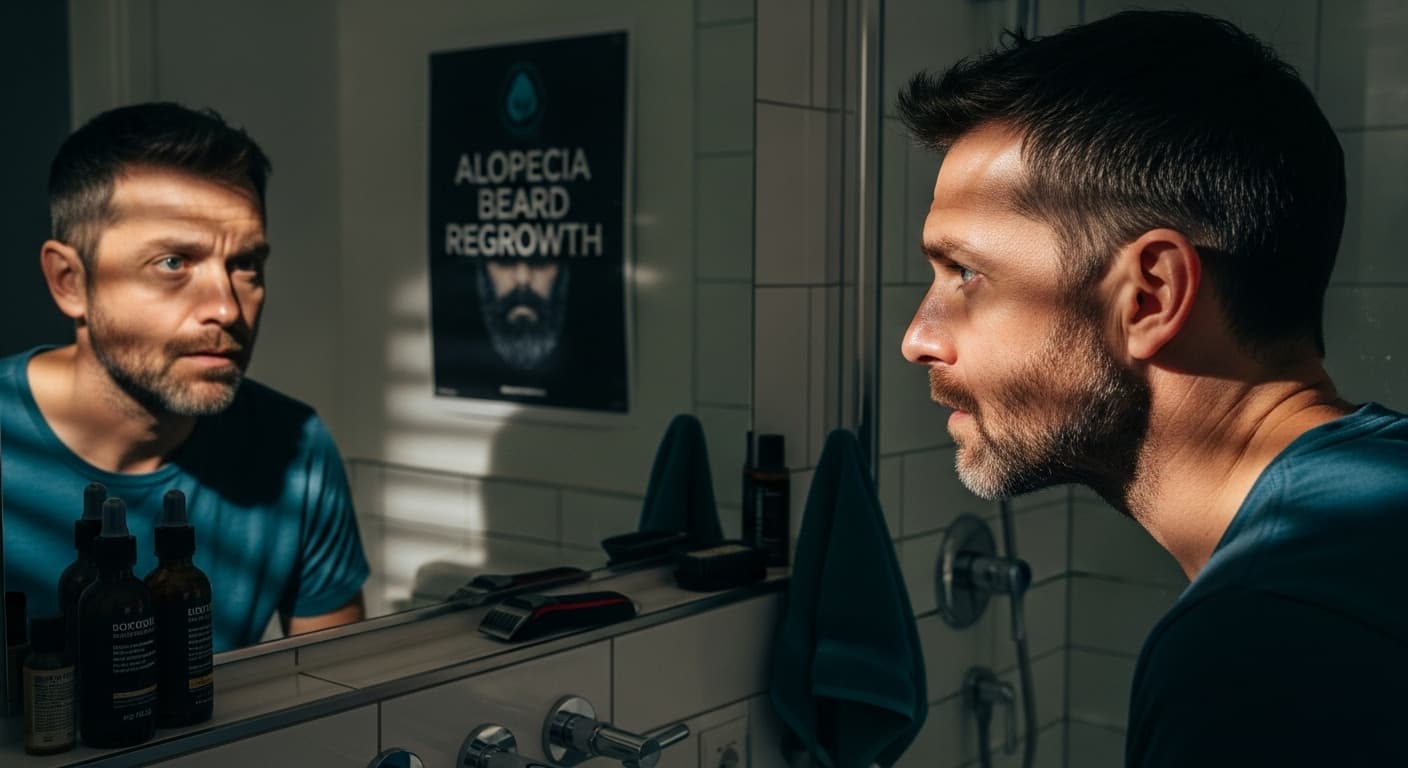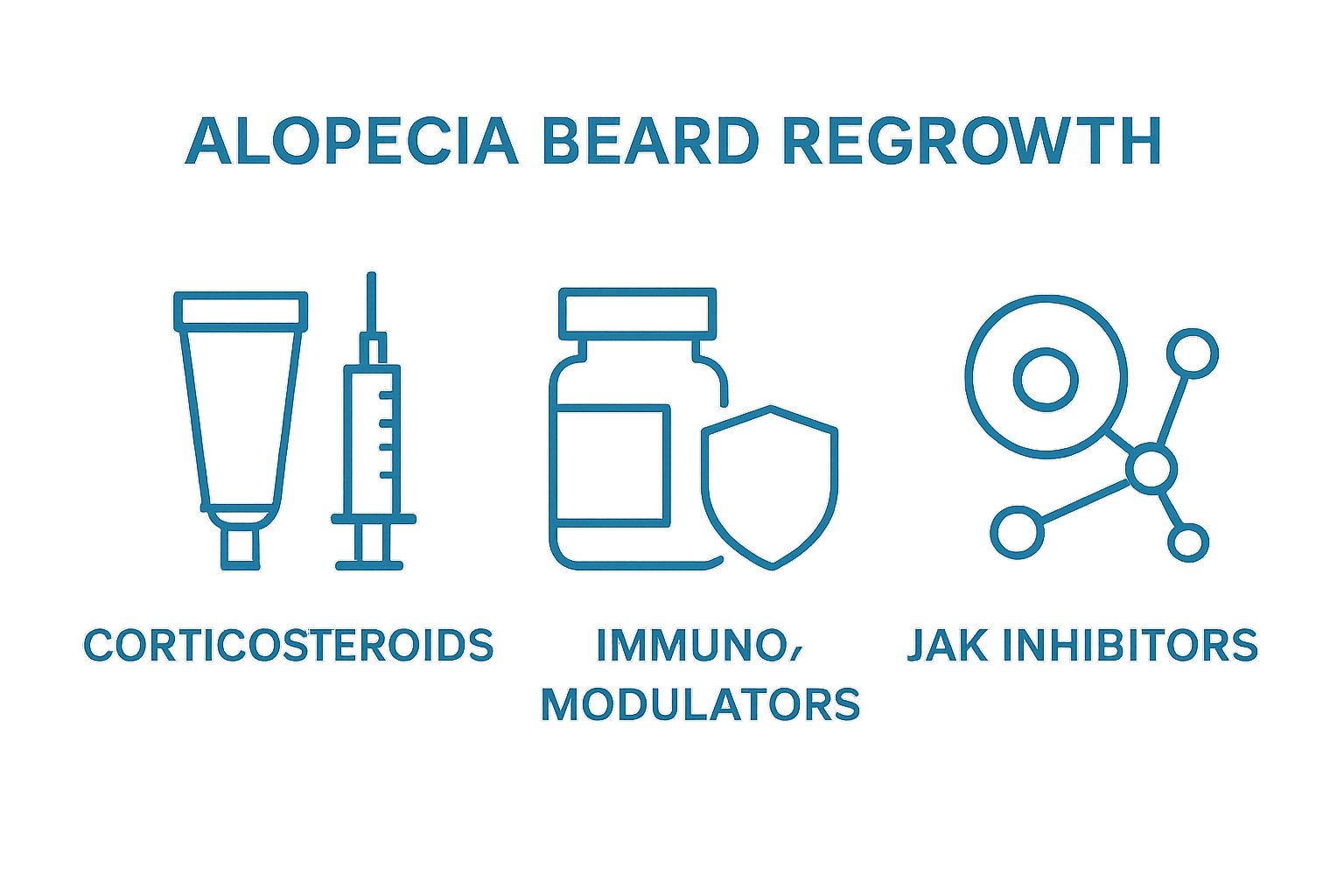Blog
Learning Materials
Understanding Alopecia Beard Regrowth: Causes and Solutions
Updated: September 13, 2025

Alopecia strips away more than just hair, often stealing confidence and reshaping identity in the process. Most guys expect beard growth to be a simple, predictable rite of passage, but for some, this journey takes a sharp turn. In fact, studies show that autoimmune beard hair loss can strike suddenly, leaving up to 2 out of every 100 men with patchy or even complete facial hair loss. That number may sound small, but the emotional and physical impact can be far bigger than anyone expects.
Table of Contents
- What Is Alopecia And How Does It Affect Beard Growth?
- The Importance Of Understanding Hair Loss Conditions
- How Alopecia Influences Hair Follicle Functionality
- Exploring Treatment Options For Alopecia Beard Regrowth
- Real-Life Experiences: Success Stories And Challenges
Quick Summary
| Takeaway | Explanation |
|---|---|
| Alopecia causes unpredictable hair loss. | This autoimmune condition can lead to sudden bald spots, particularly in beard areas. |
| Beard hair regrowth varies individually. | Factors like genetics and stress influence how significantly alopecia affects beard growth and regrowth potential. |
| Hair loss can indicate health issues. | Unexpected hair loss may signal underlying problems such as hormonal imbalances or autoimmune disorders. |
| Psychological impacts of hair loss are significant. | Men may face anxiety, reduced self-esteem, and social withdrawal due to beard loss. |
| Targeted treatments can aid beard regrowth. | Medical interventions, including corticosteroids and advanced therapies, may help restore hair growth in affected areas. |
What is Alopecia and How Does it Affect Beard Growth?
Alopecia is a complex autoimmune condition that disrupts hair growth patterns, specifically targeting hair follicles and causing unpredictable hair loss. When this condition impacts beard growth, it creates unique challenges for men experiencing localized hair loss in facial hair regions. Learn more about beard alopecia to understand its intricate mechanisms.
Understanding Alopecia Mechanisms
At its core, alopecia occurs when the body's immune system mistakenly attacks hair follicles, perceiving them as foreign entities. This autoimmune response triggers inflammation that interrupts normal hair growth cycles, causing hair to fall out in distinctive round or oval patches. For beard regions, this manifests as sudden, unexpected hair loss that can range from small spots to complete beard area baldness.
The immune system's misguided attack leads to several potential scenarios:
- Temporary hair loss with potential spontaneous regrowth
- Recurring hair loss patterns
- Potential progression to more extensive hair loss regions
Impact on Beard Growth Patterns
When alopecia specifically targets beard growth, it creates a unique set of challenges. According to clinical research from the National Institutes of Health, beard alopecia can manifest in multiple forms. Some men experience small, discrete patches of hair loss, while others might encounter more widespread facial hair disruption. The unpredictable nature of this condition means that hair regrowth is not guaranteed and can vary significantly between individuals.
Genetic predisposition, stress levels, and overall immune system health play crucial roles in determining how alopecia will impact an individual's beard growth. While the condition can be emotionally challenging, understanding its mechanisms provides a foundation for potential management and treatment strategies.
The Importance of Understanding Hair Loss Conditions
Understanding hair loss conditions transcends mere cosmetic concerns, representing a critical aspect of personal health and psychological well-being. Hair loss can signal underlying health issues, impact emotional resilience, and require targeted medical intervention. Explore our comprehensive guide on hair loss indicators to gain deeper insights into this complex condition.
Health Diagnostic Significance
Hair loss serves as a powerful physiological indicator that can reveal significant information about an individual's overall health status. Unexpected or rapid hair loss might signal critical underlying conditions such as hormonal imbalances, nutritional deficiencies, autoimmune disorders, or potential chronic diseases. By recognizing and investigating these changes early, individuals can proactively address potential health risks before they escalate.
Key health indicators potentially revealed through hair loss include:
- Thyroid dysfunction
- Nutritional deficiencies
- Stress-related hormonal changes
- Potential autoimmune disorders
- Emerging metabolic conditions
Psychological and Social Impact
According to clinical research from the National Institutes of Health, hair loss extends beyond physical manifestations, profoundly influencing an individual's psychological landscape. The emotional toll of hair loss can significantly impact self-esteem, social interactions, and mental health. Men experiencing beard or scalp hair loss often report increased anxiety, reduced confidence, and potential social withdrawal.
Recognizing hair loss as more than a superficial concern allows individuals to approach their condition with compassion, seek appropriate medical guidance, and develop comprehensive strategies for management and potential treatment. Understanding the intricate connections between physical symptoms and broader health contexts empowers individuals to take proactive steps toward holistic wellness.
How Alopecia Influences Hair Follicle Functionality
Alopecia fundamentally disrupts the intricate biological mechanisms governing hair growth, creating a complex cascade of cellular interactions that impair normal follicular function. This condition transforms hair follicles from dynamic, productive structures into compromised biological systems unable to sustain consistent hair production. Learn more about hair follicle dynamics to understand these nuanced processes.
Immune System Disruption of Follicular Processes
At the cellular level, alopecia represents a profound immunological assault on hair follicles. The immune system mistakenly identifies hair follicle cells as foreign entities, triggering an inflammatory response that fundamentally alters follicular structure and function. This autoimmune attack causes targeted destruction of hair growth mechanisms, preventing normal cyclical regeneration of hair strands.
Key disruptions in follicular functionality include:
- Interruption of hair growth cycle stages
- Inflammatory cellular responses targeting follicle tissues
- Reduction of follicular stem cell regenerative capacity
- Suppression of protein and keratin production
- Compromised metabolic signaling within follicular structures
Cellular Mechanisms of Hair Loss
According to research published in the National Institutes of Health, alopecia triggers a complex immunological cascade that specifically targets hair follicle immune privilege mechanisms. When these protective cellular pathways are disrupted, cytotoxic T lymphocytes initiate an aggressive response that miniaturizes and potentially destroys hair follicle structures. This process transforms healthy, active follicles into dormant or permanently damaged cellular units, dramatically impacting hair regeneration potential.
Understanding these intricate cellular interactions provides crucial insights into how alopecia fundamentally rewrites the biological programming of hair growth, offering potential pathways for future therapeutic interventions and targeted treatment strategies.
Exploring Treatment Options for Alopecia Beard Regrowth
Addressing alopecia beard regrowth requires a multifaceted approach that combines medical interventions, targeted therapies, and personalized treatment strategies. Understanding the diverse options available empowers individuals to make informed decisions about managing their condition. Discover comprehensive beard hair loss solutions to navigate this complex journey effectively.
Medical and Pharmaceutical Interventions
Pharmaceutical treatments represent the primary line of defense in combating alopecia beard regrowth challenges. Physicians typically recommend a combination of targeted therapies designed to modulate immune responses and stimulate hair follicle regeneration.
The table below summarizes common types of medical and pharmaceutical interventions for alopecia beard regrowth, outlining their approach and primary purpose.
| Treatment Approach | Method/Example | Purpose |
|---|---|---|
| Topical Corticosteroid Creams | Creams applied to affected areas | Reduce local inflammation and immune response |
| Intralesional Corticosteroid Injections | Injections directly into bald patches | Suppress immune attack in specific locations |
| Immunomodulatory Medications | Oral or topical agents | Modulate or suppress abnormal immune activity |
| Minoxidil Applications | Topical minoxidil | Stimulate hair follicle activity and growth |
| Systemic Immunosuppressant Therapies | Oral/systemic medications | Suppress body-wide immune response |
| Corticosteroid treatments emerge as a critical intervention, working to suppress inflammatory immune responses and potentially restore hair growth mechanisms. |
Key medical treatment approaches include:
- Topical corticosteroid creams
- Intralesional corticosteroid injections
- Immunomodulatory medications
- Minoxidil applications
- Systemic immunosuppressant therapies
Advanced Therapeutic Strategies
According to comprehensive research published in medical journals, emerging therapeutic strategies are expanding the potential for alopecia beard regrowth. Cutting-edge treatments like Janus kinase (JAK) inhibitors show promising results in disrupting the autoimmune mechanisms that trigger hair loss. These advanced interventions target the cellular pathways responsible for immune system dysfunction, offering hope for more effective and targeted beard hair restoration.
The most successful treatment approaches recognize that alopecia beard regrowth is not a one-size-fits-all solution. Personalized medical assessments, comprehensive diagnostic evaluations, and tailored treatment plans are essential in developing effective strategies for managing and potentially reversing beard hair loss.

Real-Life Experiences: Success Stories and Challenges
Personal narratives of alopecia beard regrowth reveal a complex landscape of emotional resilience, medical innovation, and individual variability. These lived experiences offer profound insights into the psychological and physiological challenges individuals face when confronting unexpected hair loss. Explore more personal journeys of hair restoration to understand the nuanced human experience behind this condition.
Psychological Impact and Emotional Resilience
Beyond the physical manifestation of hair loss, individuals with alopecia confront significant emotional challenges that extend far beyond mere cosmetic concerns. Beard loss can profoundly impact personal identity, challenging men's perceptions of masculinity and self-image. Many individuals report experiencing intense emotional responses ranging from frustration and anxiety to depression, highlighting the critical intersection between physical appearance and psychological well-being.
Here is a quick reference table summarizing potential emotional and psychological effects associated with alopecia beard loss, along with their impacts on daily life.
| Emotional Effect | Description | Impact on Daily Life |
|---|---|---|
| Reduced Self-Confidence | Loss of belief in one's appearance or abilities | Can hinder social and professional interactions |
| Social Anxiety | Heightened nervousness in social settings | May lead to withdrawal from gatherings |
| Feelings of Vulnerability | Increased sense of exposure due to appearance | Impacts overall sense of security |
| Uncertainty About Personal Identity | Questioning one's self-image and masculinity | Can lead to emotional distress |
| Emotional Fluctuations | Rapid changes in mood during treatment or relapse | Difficulties with consistency in routines |
| Coping Mechanism Development | Adoption of mental strategies to manage stress | Supports resilience and adaptation |
Common emotional experiences include:
- Feelings of vulnerability and reduced self-confidence
- Social anxiety related to appearance changes
- Uncertainty about personal identity
- Emotional fluctuations during treatment
- Developing coping mechanisms and resilience
Treatment Success and Personal Transformations
According to clinical case studies published in medical research, remarkable individual success stories demonstrate the potential for beard regrowth. One documented case revealed a 33-year-old man with a seven-year history of alopecia universalis achieving complete beard restoration after just four months of targeted treatment. Such narratives underscore the importance of personalized medical approaches and maintaining hope throughout the treatment journey.
These real-life experiences illuminate the multifaceted nature of alopecia beard regrowth, emphasizing that successful management requires a holistic approach combining medical intervention, emotional support, and individual perseverance. Each journey represents a unique narrative of resilience, medical innovation, and personal transformation.

Ready to Take Control of Your Beard Regrowth Journey?
Struggling with unpredictable beard hair loss from alopecia can be both frustrating and emotionally challenging. This article highlighted how autoimmune responses disrupt hair follicles, creating confusing regrowth patterns and impacting your confidence. But you do not have to navigate this alone. MyHair.ai transforms your experience by making scientific analysis and support accessible for every stage of your beard and hair regrowth process.

See real improvement by leveraging AI-driven hair health insights that are tailored to your unique beard loss pattern. Instantly upload your scan to get a personalized report, track progress over time, and receive expert-backed product recommendations built specifically for your situation. Reclaim your confidence and move forward with clear, actionable steps today at MyHair.ai. The sooner you start, the sooner you unlock answers for your personal beard regrowth solution.
Frequently Asked Questions
What is alopecia, and how does it affect beard growth?
Alopecia is an autoimmune condition that causes hair loss by targeting hair follicles, leading to unpredictable hair growth patterns. When it affects the beard area, it can result in localized patches of hair loss or complete baldness in facial hair regions.
What are the primary treatment options for alopecia beard regrowth?
Treatment options for alopecia beard regrowth include topical corticosteroids, intralesional corticosteroid injections, immunomodulatory medications, minoxidil applications, and advanced therapies like JAK inhibitors to help stimulate hair follicle regeneration.
How does stress influence beard growth in individuals with alopecia?
Stress may exacerbate alopecia by impacting the immune system's function. Stress management is crucial for those experiencing hair loss, as it can lead to improved mental well-being and potentially aid in the regrowth process.
Can dietary changes help with alopecia beard regrowth?
Yes, dietary changes can support overall health and potentially benefit hair growth. Ensuring adequate intake of vitamins and minerals, particularly those linked to hair health like biotin, zinc, and omega-3 fatty acids, can be beneficial for individuals with alopecia.